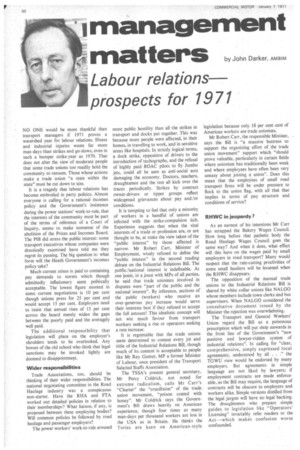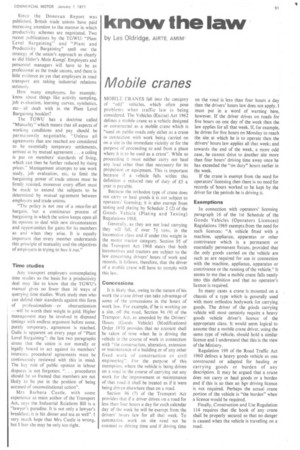management
Page 52

Page 53

If you've noticed an error in this article please click here to report it so we can fix it.
matters by John Darker, AMBIM
Labour relations prospects for 1971
NO ONE would be more thankful than transport managers if 1971 proves a watershed year for labour relations. Illness and industrial injuries waste far more man-days than strikes and go-slows, even in such a bumper strike-year as 1970. That does not alter the view of moderate people that some trade unions too readily hold the community to ransom. Those whose actions make a trade union "a state within the state" must be cut down to size.
It is a tragedy that labour relations has become embroiled in party politics. Almost everyone is calling for a rational incomes policy and the Government's insistence during the power stations' work-to-rule, that the interests of the community must be part of the terms of reference of a Court of Inquiry, seems to make nonsense of the abolition of the Prices and Incomes Board. The PIB did stress the public interest: some transport executives whose companies were drastically examined have told me they
• regret its passing. The big question is: what form will the Heath Government's incomes policy take?
Much current stress is paid to containing pay demands to norms which though admittedly inflationary seem politically acceptable. The lowest figure mooted in some current negotiations is 10 per cent though unions press for 25 per cent and would accept 15 per cent. Employers need to insist that annual rises of 15 per cent across the board merely widen the gaps between the poorly paid and the averagely well paid.
The additional responsibility that legislation will place on the employer's shoulders tends to be overlooked. Any bosses of the old school who think that legal sanctions may be invoked lightly are doomed to disappointment.
Wider responsibilities Trade Associations, too, should be thinking of their wider responsibilities. The national negotiating committee in the Road Haulage industry was a conspicuous non-starter. Have the RHA and FTA worked out detailed policies in relation to their memberships? What liaison, if any, is proposed between these employing bodies? Will common policies be followed by road haulage and passenger employers?
The power workers' work-to-rule aroused more public hostility than all the strikes in transport and docks put together. This was because more people were affected, in their homes, in travelling to work, and in sensitive areas like hospitals. In strictly logical terms, • a dock strike, opposition of drivers to the introduction of tachographs, and the refusal of highly paid BOAC pilots to fly Jumbo jets, could all be seen as anti-social acts damaging the economy. Doctors, teachers, draughtsmen and the rest all kick over the traces periodically. Strikes by contract owner-drivers or tipper groups reflect widespread grievances about pay and/or conditions.
It is tempting to feel that only a minority of workers in a handful of unions are infected with the strike-compulsion itch. Experience suggests that when the vital interests of a trade or profession are, or are thought to be, at stake the view taken of the "public interest" by those affected is narrow. Mr Robert Carr, Minister of Employment, wisely refused to define the "public interest" in the second reading debate on the Industrial Relations Bill. The public /national interest is indefinable. At one 'point, in a joust with MPs of all parties, he said that trade unionists involved in disputes were "part of the public and the national interest". By inference, sections of the public (workers) who receive an over-generous pay increase would serve their interests best if they refused to accept the full amount! This idealistic concept will not win much favour from transport workers seeking a rise or operators seeking a rate increase.
It is regrettable that the trade unions seem determined to contest every jot and tittle of the Industrial Relations Bill, though much of its content is acceptable to people like Mr Ray Gunter, MP a former Minister of Labour, once president of the Transport Salaried Staffs Association.
The TSSA's present general secretary, Mr Percy Coldrick, not noted for extreme radicalism, calls Mr Carr's "Charter" the "crucifixion" of the trade union movement, "poison coated with honey". Mr Coldrick says the Government's Bill draws heavily on American experience, though four times as many man-days per thousand workers are lost in the USA as in Britain. He thinks the Tories are keen on American-style legislation because only. 18 per cent cent of American workers are trade unionists.
Mr Robert Carr, the responsible Minister, says the Bill is "a massive buttress to support the organizing effort of the trade union movement" support which "should prove valuable, particularly in certain fields where unionism has traditionally been weak, and where employees have often been very uneasy about joining a union". Does this mean that the emploYees of small road transport firms will be under pressure to flock to the union flag, with all that that implies in terms of pay. structure and conditions of service?
RHWC in jeopardy?
As an earnest of his intentions Mr Carr has scrapped the Bakery Wages Council. How long before that pathetic body the Road Haulage Wages Council goes the same way? And when it does, what effect will this have on the wages paid by small employers in road transport? Many would suspect that the rate-cutting proclivities of some small hauliers will be lessened when the RHWC disappears.
The opposition of the manual trade unions to the Industrial Relations Bill is shared by white collar unions like NALGO whose members include town clerks and bus supervisors. When NALGO considered the consultative document issued by the Minister the rejection was overwhelming.
The Transport and General Workers' Union regard the Bill as a poisonous prescription which will put shop stewards in the front line of the Government's "new punitive and lawyer-ridden system of industrial relations". In calling for "clear, comprehensive, simply expressed local agreements, understood by all . . ." the TGWU view would be endorsed by many employers. But agreements in simple language are not liked by lawyers; if employment contracts are made enforceable, as the Bill may require, the language of contracts will be obscure to employers and workers alike. Simple versions distilled from the legal jargon will have no legal backing. The draughtsmen who prepare simple guides, to legislation like "Operators' Licensing" invariably refer readers to the Act—which makes confusion worse confounded. Since the Donovan Report was published, British trade unions have paid increasing attention to the manner in which productivity schemes are negotiated. Two recent publications by the TGWU: "Plant Level Bargaining" and "Plant and Productivity Bargaining" spell out the strategy of the union's approach as clearly
as did Hitler's Mein Kampf Employers and
personnel managers 9iill have to be as professonal as the trade unions, and there is little evidence as yet that employers in road transport are taking industrial relations seriously.
How many employers, for example, know about things like activity sampling, job evaluation, learning curves, synthetics, etc— all dealt with in the Plant Level Bargaining booklet?
The TGWU has a doctrine called "Mutuality" which means that all aspects of working conditions and pay should be permanently negotiable. "Unless all agreements that are reached are considered to be essentially temporary settlements, arrived at by mutual agreement. .. a ceiling is put on members' standards of living, which can then be further reduced by rising prices." Management attempts to use work study. job evaluation, etc, to limit the bargaining power of trade unions must be firmly resisted, moreover every effort must be made to extend the subjects to be determined by mutual agreement between employers and trade unions.
"The policy is not one of a once-for-all bargain, but a contintious process of bargaining in which the union keeps open all its options to deal with new circumstances and opportunities for gains for its members as and when they arise. It is equally important that every member understands this principle of mutuality and the objectives of employers in trying to buy it out."
Time studies
Any transport employers contemplating time studies as the basis for a productivity deal may like to know that the TGWU's manual gives no fewer than 16 ways of querying time studies. Work study men who can defend their standards against this form of professionalism—or obstructionism —will he worth their weight in gold. Higher management may be involved in disputed timings with endless argument before some, purely temporary, agreement is reached. Guile is apparent on every page of "Plant Level Bargaining": the last two paragraphs stress that the union is not morally or legally bound to act against its members' interests; procedural agreements must be continuously reviewed with this in mind. The key role of public opinion in labour disputes is not forgotten. ". . . procedures should be so framed that members are not likely to be put in the position of being accused of unconstitutional action".
Mrs Barbara Castle. with some experience as main author of the Transport Act, says the Industrial Relations Bill is a "lawyer's paradise: It is not only a lawyer's breakfast; it is his dinner and tea as well". I very much hope that Mrs Castle is wrong, but I fear she may be only too right.




















































































